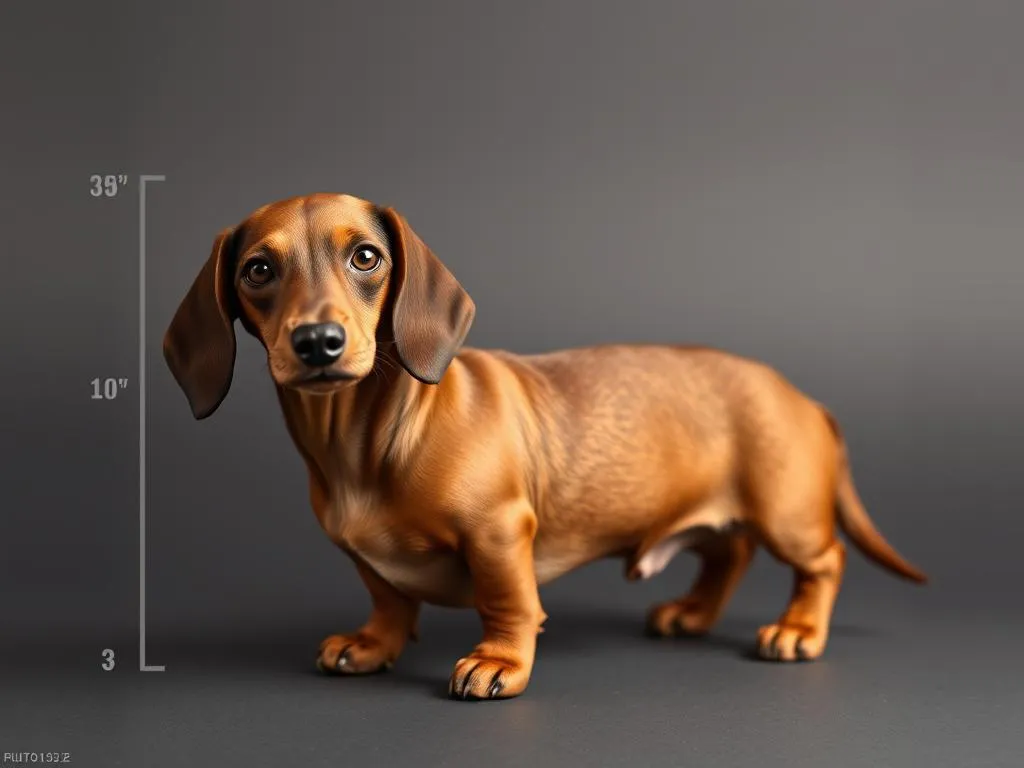
Introduction
The Mini Dachshund is a small yet spirited breed known for its long body and short legs. Originating in Germany, this adorable companion was initially bred to hunt small game like badgers and rabbits. Over the years, the Mini Dachshund has gained immense popularity as a family pet due to its playful personality, intelligence, and loyalty.
Understanding the size and weight growth of Mini Dachshunds is crucial for their health and well-being. Monitoring their growth can help prevent potential health issues, ensuring they receive the proper care and nutrition. This article will delve into the growth stages, weight expectations, and essential caring tips for Mini Dachshunds.
Understanding Mini Dachshunds
Breed Characteristics
Mini Dachshunds typically weigh between 8 to 11 pounds and stand about 5 to 7 inches tall at the shoulder. They come in three coat types: smooth, longhaired, and wirehaired, with a variety of colors including black, chocolate, and dapple. Their unique appearance, characterized by a long body and short legs, makes them easily recognizable.
In terms of temperament, Mini Dachshunds are known for being affectionate, intelligent, and sometimes stubborn. They are playful and enjoy being around their families, making them great companions.
Comparison with Standard Dachshunds
When comparing Mini Dachshunds to standard Dachshunds, the most notable difference is size. Standard Dachshunds weigh between 16 to 32 pounds and are taller, typically 8 to 9 inches at the shoulder. This size variation can lead to different health considerations; for instance, Mini Dachshunds are more susceptible to certain health issues like obesity and spinal problems due to their elongated bodies.
Growth Stages of Mini Dachshunds
Puppy Stage (0-6 months)
During the puppy stage, Mini Dachshunds experience rapid growth. On average, a Mini Dachshund puppy weighs around 2 to 4 pounds at birth and can reach 5 to 7 pounds by three months. By six months, they typically weigh between 8 to 10 pounds.
Proper nutrition is vital during this stage. High-quality puppy food containing the right balance of protein, fats, and carbohydrates will support their growth. Puppies also require frequent meals; feeding them three to four times a day is recommended.
Adolescent Stage (6-12 months)
The adolescent stage brings growth spurts and weight fluctuations. By the end of this stage, Mini Dachshunds usually weigh between 10 to 11 pounds. Socialization and training are crucial during this period, as they are developing their personality. Positive reinforcement training methods work best, helping to shape their behavior while strengthening the bond between you and your puppy.
Adult Stage (1 year and beyond)
By the time they reach one year, Mini Dachshunds achieve their full size, typically weighing between 8 to 11 pounds. It’s essential to maintain a healthy weight through balanced nutrition and regular exercise. Overweight Mini Dachshunds are at higher risk for health issues, including joint problems and heart disease.
Mini Dachshund Size and Weight Growth Chart
Growth Chart Overview
Understanding the Mini Dachshund size weight growth chart is essential for tracking your dog’s development. The chart typically includes age, weight, and height measurements.
Sample Growth Chart for Mini Dachshunds
| Age | Average Weight | Average Height |
|---|---|---|
| 0-3 months | 2-4 pounds | 5-6 inches |
| 3-6 months | 5-7 pounds | 6-7 inches |
| 6-12 months | 8-10 pounds | 7 inches |
| 1 year | 8-11 pounds | 8-9 inches |
| 2 years and beyond | 8-11 pounds | 8-9 inches |
Importance of Monitoring Growth
Monitoring the growth of your Mini Dachshund is essential for ensuring they are developing healthily. Regular weigh-ins and height measurements can help you track their growth effectively. If you notice any significant deviations from the expected growth chart, it’s advisable to consult a veterinarian to rule out any potential health issues.
Factors Influencing Size and Weight
Genetics
Genetics play a significant role in determining the size and weight of your Mini Dachshund. Breeding practices can influence traits passed down from parents, so it’s essential to research the lineage of your puppy to understand potential size outcomes.
Nutrition
A balanced diet is crucial for maintaining a healthy weight. High-quality dog food formulated for small breeds is recommended. It’s also important to establish a feeding schedule. Puppies should be fed three to four times a day, while adults typically do well with two meals daily.
Exercise
Mini Dachshunds require regular exercise to stay fit and healthy. Daily walks, playtime, and interactive games are excellent ways to keep them active. However, due to their elongated spine, be mindful of high-impact activities that could strain their backs.
Health Considerations
Common Health Issues
Mini Dachshunds are prone to several health conditions, particularly related to their size. Common issues include intervertebral disc disease, obesity, and dental problems. It’s important to monitor their weight and ensure they maintain a healthy diet to mitigate these risks.
Regular Vet Check-ups
Routine veterinary check-ups are essential for your Mini Dachshund’s health. Regular assessments help catch any potential health issues early and ensure vaccinations and preventive care are up to date. Discuss any concerns about your dog’s growth or weight with your vet during these visits.
Caring for Your Mini Dachshund
Ideal Living Conditions
Mini Dachshunds adapt well to various living conditions, including apartments and homes with yards. However, they thrive best in a space that allows them to explore and play. Ensure your home is safe, with no small objects within reach that they could swallow.
Training Tips
Training your Mini Dachshund can be a rewarding experience. Basic commands like sit, stay, and come should be taught using positive reinforcement techniques. Consistency and patience are key, as Mini Dachshunds can be a bit stubborn.
Grooming Needs
Grooming needs vary based on coat type. Smooth coats require minimal grooming, while longhaired and wirehaired types need regular brushing to prevent matting. Regular nail trimming and dental care are also essential parts of their grooming routine.
Conclusion
Monitoring the growth and health of your Mini Dachshund is vital for ensuring they lead a happy and healthy life. By understanding their growth stages and weight expectations, you can provide the necessary care and nutrition. Regular veterinary visits, a balanced diet, and adequate exercise will contribute to their overall well-being. Owning a Mini Dachshund can bring immense joy, and with the right care, they can thrive as beloved family members for years to come.









